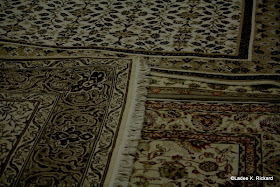5/20/2012 From my trip experience, no tour is considered complete without a stop at the local rug weaving school and center. I didn't know this before I left home, so I am unprepared to purchase a magic carpet. I will enjoy the learning experience.
The bus driver had passed around the "comments and feedback" paper before we stopped at the Turkmen Carpet Weaving Center. This will become an important fact when we complete our time at this stop.
The yards were kept nicely trimmed. Flower gardens were all around the property as were large pottery pieces.
This is an entranceway to the school, or perhaps one of the offices. Very picturesque.
The school owner invited us all to gather around this little gadget while he explained the process to make silk thread. I'll give you several views of this. The silk worm cocoons float in the warm water (the red brick container) to soften the gum that binds the silken filaments together. 10-12 filaments are twisted together to make a single thread using a metal spinner (hard to see in this photo), and then runs down to the reel wrapping device. The black machine with the white thread around it is where the product is made in to an organized bunch.
The worker caught some of the threads of the cocoons to get the unraveling started. One cocoon can have 1000-2000 feet of silk filament.
Several threads are pulled and twisted together.
The little cocoons bob and weave in the water as they unravel. The threads are twisted to make one single thread and then wound around the reels.
A weaver is working on a fairly new rug. The weaving material is hung close-by. The colors are very vibrant.
Here are various shads of green, a blue, and black thread.
There was a wide variety of yarn colors.
Another worker is making a magic carpet. These colors look muted and neutral.
We then went in to the show room for the grand show and tell with all of the rugs. The group sat around the edge of the room while the show began.
There are many rugs available. I wonder how long it took to make these, and how long it takes before the families and workers receive money for making a rug.
The patterns were intricate.
One of the staff held the magic carpet so that we could see the details. The men would snap the rug out flat, and let it float to the ground (aka magic carpet!). They would then spin it so that you could see the color changes with the direction that the carpet is viewed.
I think that it is customary to offer a snack and a drink. I had white wine, local, and they also offered a cold apple tea.
The carpets are tightly hand knotted, with a gazillion knots.
This shows some of the variety in the patterns. It would be hard to buy one. It was hard to pick a "favorite" while we were sitting there. I would be very stressed if I had to make a decision on which one to take home.
I don't know if many people in our group were there to purchase carpets. I don't recall that this shopping stop was advertised and, while it was a delight to stop and see these things, there seemed to be an expectation from the school and the tour guide that we would be buying like crazy. Hey, our group was on the budget bus tour.
Part two of the Turkmen Carpet story continues with the next blog post.


















No comments:
Post a Comment
Thank you for your comments. You add to the blog by allowing us to hear your unique viewpoint.
Note: Only a member of this blog may post a comment.